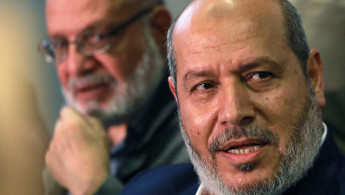October 7 attack was 'wakeup to the world' on Israeli occupation, Hamas deputy leader tells BBC
Hamas deputy leader Khalil al-Hayya has reiterated his group's stance on the 7 October attacks, denying that orders were given for attacks on civilians and saying the event was a wake-up call to the world.
Hayya, who is Hamas' most senior official outside Gaza and leads ceasefire negotiations for the group, spoke to the BBC in Doha, days before the first anniversary of the 7 October attacks in southern Israel which killed around 1,200 people and saw 250 people taken captive.
The subsequent war on Gaza has seen the whole enclave destroyed, with at least 41,000 Palestinians killed and much of Hamas's leadership taken out or suspected dead.
"We had to sound an alarm to the world to tell them that we are a people with a cause and demands," Hayya said when asked why his group launched the attack.
"It was a blow to Israel and a wakeup to the international community. We had had to do something to tell the world we are a people who have been under occupation for decades."
BBC international editor Jeremy Bowen then pressed the Hamas official on why civilians were killed in the attack.
"We don't endorse harming civilians. On the ground there were certainly personal mistakes and actions, fighters may have felt their lives were in danger," he said.
Following the 7 October attack, Israel launched its latest assault on Gaza, which has killed has not only killed tens of thousands of civilians but also wounded close to 100,000, many with life-changing injuries.
Nearly a year on, vast areas of the coastal enclave is now in ruins, with key civilian infrastructure reduced to rubble.
Israel says it has targeted and degraded Hamas' capabilities, with top figures in the group, including political wing leader Ismail Haniyeh, politburo member Saleh al-Arouri and armed wing chief Mohammed al-Deif, having been killed or claimed killed by Israel over the past year.
While speaking to Bowen, Hayya himself wore a cast for a foot injury sustained in the attack that killed Haniyeh in Tehran.
"If the world gave us our legitimate rights, the cycle of violence would stop," Hayya said when asked whether the 7 October attack was worth the human cost later inflicted by Israel.
When asked about a ceasefire, the Hamas leader indicated that it is up to Israeli Prime Minister Benjamin Netanyahu to stop the war.
"We say that Israel wants to eliminate Hamas and the Palestinian people," Hayya said.
"So far, Israel does not recognise a one state solution, or a two state solution. Israel rejects it all: International resolutions, international law and our rights."
As the anniversary of the 7 October attack approaches on Monday, hopes for a ceasefire remain distant after Israel expanded its attacks on Lebanon and attempted a ground incursion.
Shortly after the BBC interview with Hayya, fears of a broader regional escalation were raised when Iran launched a barrage of missiles on Israeli military sites.
Iranian officials said the attack came after a period of restraint shown by Tehran to allow a Gaza ceasefire to be negotiated.





 Follow the Middle East's top stories in English at The New Arab on Google News
Follow the Middle East's top stories in English at The New Arab on Google News


